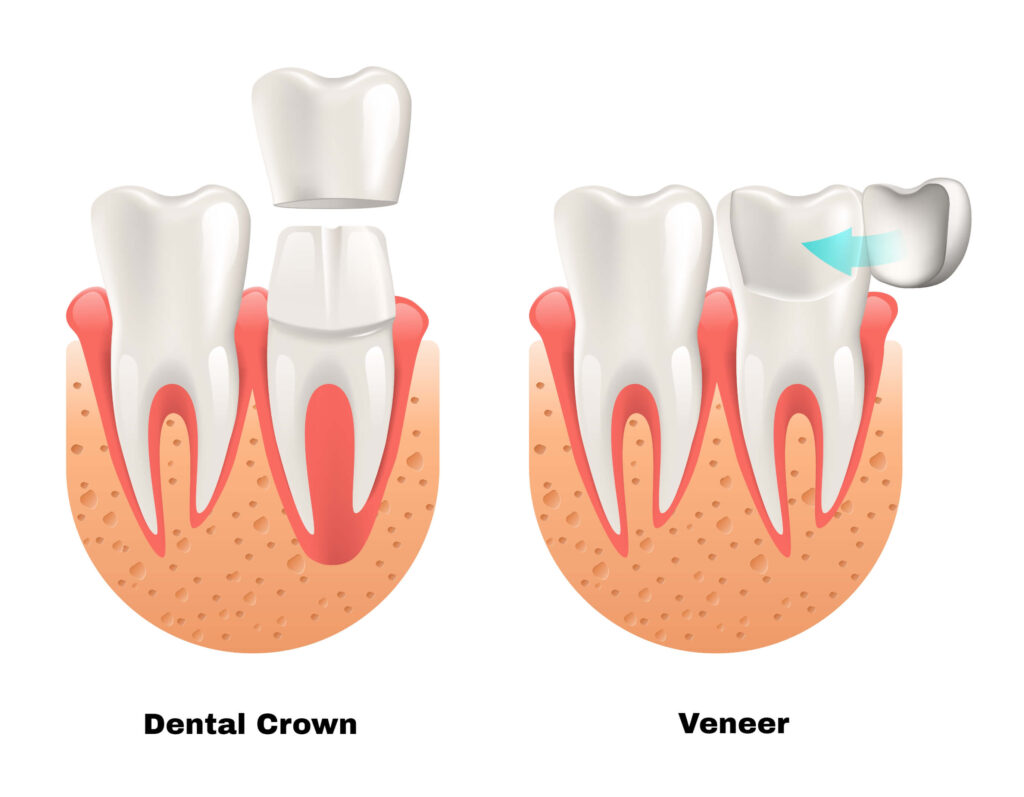
Having a chipped tooth can be embarrassing and uncomfortable, and it may cause self-consciousness, pain, and even difficulty eating. But the good news is that there are ways to fix it! Whether you’re looking for a quick solution or something more long-term, this article will provide tips on how to repair your chipped tooth, and we’ll discuss what options are available so you can choose one that fits your needs best. We’ll also touch on prevention measures so you can avoid future chips and repair existing ones.
So if you’re dealing with an unsightly chip in your smile, don’t despair – help is here! Read on to learn how to fix a chipped tooth from your Fairview dentist.
When you chip your tooth, it’s essential to take proper care of it right away. If the damage is minor, then you can get by by simply taking extra caution. However, if the chipped area is large, has a jagged edge, or exposes a portion of the natural tooth beneath, more extensive treatment may be necessary.
Caring for a chipped or broken tooth can be a difficult and uncomfortable experience. Fortunately, there are a few steps you can take to help ease the pain and protect your tooth.
First, rinse the tooth gently in a bowl of lukewarm water for no more than 10 seconds if there is dirt or foreign matter on it. Do not scrub, scrape, or use alcohol to remove dirt.
Second, apply cold compresses to the outside area every few minutes to keep down the swelling. You can also take over-the-counter pain relievers such as ibuprofen or acetaminophen to help with the pain.
Third, you can also try an over-the-counter dental anesthetic such as Orajel (benzocaine) or Anbesol (lidocaine). These are available at most pharmacies. It is important to seek professional dental care as soon as possible if you have a chipped or broken tooth, and your dentist will be able to assess the damage and recommend the best course of action.
Whether the damage is minor or severe, it’s always best to get checked by a dentist who can assess the severity of your injury and determine what steps should be taken next. If you require further action, your dentist may recommend having composite bonding or veneers placed on your teeth to restore its natural appearance. Here are different types of cracked teeth.
If you have broken or dislodged teeth, it is imperative to treat them as emergencies and seek immediate assistance from your dentist. Even if you do not experience any other symptoms, contacting your local general dentist is recommended if you have a broken or dislodged tooth. However, if your tooth is only chipped, you can contact the dentist at your convenience for their advice and assessment.
If you have a chipped or broken tooth, it’s important to seek professional dental help as soon as possible. An untreated chipped or broken tooth can result in pain and infection, leading to more serious concerns such as tooth decay and even tooth loss. A dentist will assess your situation and determine the best course of action for repair and restoration.
In some cases, a simple filling may be enough to fix a minor chip or crack on the surface of the tooth. However, if there is extensive damage to the enamel of your teeth, then a dental crown might be necessary. A dental crown covers the entire visible portion of your affected tooth, providing protection from further wear and tear while also restoring its shape and natural color.
Delaying treatment when dealing with any kind of dental issue can lead to unnecessary complications down the line, which could require more invasive procedures like root canal therapy or even extraction – something that we all want to avoid at all costs! So if you experience any kind of chips or cracks in your teeth, make sure to reach out to a qualified dentist right away so they can provide appropriate care before things get worse.
Finding the right dentist to fix a chipped tooth can be intimidating. With so many dental offices available, it’s important to do your research and make sure you’re choosing someone who can provide quality care and understand your particular needs. Here are some tips for finding the perfect fit:
First, ask around. Talk to friends and family members about their experiences with dentists in your area. See if they have any local dentist recommendations or advice that might point you in the right direction. It’s also worth checking online reviews of local practices to get a better idea of what kind of service each one offers.
Once you’ve narrowed down your options, book an appointment at each office. During this meeting, take note of how comfortable and welcoming the staff is, as well as whether or not they answer all your questions clearly and thoroughly. This will give you an indication of how likely they are to handle your specific case competently.
If you need immediate assistance due to pain or infection, consider calling an emergency dentist before making a regular appointment with another practice. They may be able to offer more specialized treatment than a general practitioner would be able to provide – but keep in mind that such services often come at additional cost. Whatever route you decide on, remember that taking time to find the right dentist may pay off in the long run – after all, only they can ensure that fixing your chipped tooth is done safely and properly!
The most common methods of fixing a chipped or cracked tooth are dental veneers, dental crowns, composite resin material, root canal therapy, and porcelain veneers. Dental veneers are thin layers of custom-made ceramic that are bonded to the front surface of your teeth in order to restore the original shape and size. Composite resin material is another option for repairing chips, and it works by filling in the gaps created when a chip occurs and can be used to repair minor fractures as well. Root canal therapy is recommended if the damage caused by a chip affects the nerve of the tooth. During this procedure, the damaged tissue is removed from inside the tooth so it can heal properly. Porcelain veneers are also an option for restoring a chipped or cracked tooth; they provide additional strength while maintaining natural aesthetics. A dental crown is a long-lasting solution that offers a permanent restoration option for damaged teeth. It is designed to cover the entire tooth, providing additional support and protection to the affected area.
Your dentist will assess your individual needs and help determine which solution is best suited for you depending on where the chip occurred, how big it was, and other factors like age, oral health history, and lifestyle habits.
As an interim solution, a temporary crown is placed over the affected tooth. Although this is not a long-term fix, it can help reduce the risk of further damage by altering the way the teeth come in contact during biting. By avoiding additional pressure on the tooth, this temporary measure can help prevent the condition from worsening.

Veneers are an excellent cosmetic treatment to fix chipped teeth. They offer several advantages that other treatments don’t, and they can be used to correct many issues related to the structure of your tooth or its appearance. Veneers are thin shells made from either porcelain or resin composite material that bond directly onto the front surface of the affected teeth. This procedure is known as dental bonding, and it’s relatively quick and painless.
The veneer creates a smooth surface on the damaged tooth, making it look healthy once again. It also allows you to easily mask discoloration, chips, cracks, gaps, misalignments, and more. In some cases, veneers may even help protect your teeth against further damage since they provide an added layer of protection over them. Furthermore, this type of treatment offers longer-lasting results than temporary solutions like resin crowns or fillings.
Overall, veneers provide patients with a good solution for correcting their chipped teeth without needing invasive procedures or expensive reconstructive dentistry options. With proper oral care habits such as brushing twice daily and flossing regularly, these durable restorations can last for years.
Composite bonding is a more modern technique that involves using a special type of composite resin material that can be shaped and colored to match the appearance of your natural teeth. The bonding material adheres directly to your existing enamel, effectively hiding any chips or fractures in the process.
Compared to traditional fillings, which may include the use of metal, composite bonding offers several benefits. Firstly, you won’t have to worry about staining from metal amalgams due to its coloration matching that of your natural teeth; secondly, it has superior durability over traditional dental techniques allowing for longer-lasting results with proper care and maintenance. Additionally, because composite resins don’t contain metals like amalgam does, they’re considered much safer for those with allergies or sensitivities toward certain chemicals found in some traditional restorative materials.
In a scenario where a significant portion of the tooth is broken off, but the root remains intact, your dentist may suggest a root canal treatment. This procedure entails the placement of a post or pin in the tooth canal to strengthen its structure so that a temporary crown can be put in place. Later, a permanent crown will be cemented over the post to restore the appearance of your smile.
Until you’re able to see your dentist to repair a chipped tooth, you can consider the following self-care measures:
The best way to prevent chipped teeth is by taking good care of your oral hygiene. Regular brushing and flossing are two essential components for maintaining healthy teeth. Additionally, it’s important to see a dentist regularly for check-ups and cleanings so that any potential problems can be identified early on.
It’s also a good idea to wear a mouthguard when participating in sports activities or playing contact sports. This will help protect the teeth from injury due to impact with another person or object. If you experience trauma to the face or jaw area, it’s important to seek medical attention immediately as this could lead to further damage if not treated properly. If you experience bruxism, use a nightguard to reduce the stress on the teeth.
If you’re unable to see the dentist right away and you have a sharp edge on your tooth, you can use paraffin wax or chewing gum for a temporary fix. Over-the-counter pain relievers, such as ibuprofen (Advil), can also be helpful in managing any discomfort and swelling.
After experiencing a broken or chipped tooth, the tooth becomes more susceptible to future fractures even after undergoing repair. If the damage to the tooth is severe and is not attended to, a broken tooth may require a lengthy and costly procedure. Therefore, it is crucial to exercise extra caution and care if part of the tooth is damaged.

As your Allen and Fairview area dentist, we are here to help you restore your smile if you want to fix a broken tooth. To schedule your appointment, contact Sloan Creek Dental, and our friendly staff will be happy to assist you. You can reach us at our Fairview, TX dental office to schedule an in-person consultation with us today – 972-468-1440.
Our dental office is located in Fairview, Texas, and our patients visit us from across the surrounding areas, including Allen, Plano, McKinney, and Lucas.
We firmly believe that the internet should be available and accessible to anyone, and are committed to providing a website that is accessible to the widest possible audience, regardless of circumstance and ability.
To fulfill this, we aim to adhere as strictly as possible to the World Wide Web Consortium’s (W3C) Web Content Accessibility Guidelines 2.1 (WCAG 2.1) at the AA level. These guidelines explain how to make web content accessible to people with a wide array of disabilities. Complying with those guidelines helps us ensure that the website is accessible to all people: blind people, people with motor impairments, visual impairment, cognitive disabilities, and more.
This website utilizes various technologies that are meant to make it as accessible as possible at all times. We utilize an accessibility interface that allows persons with specific disabilities to adjust the website’s UI (user interface) and design it to their personal needs.
Additionally, the website utilizes an AI-based application that runs in the background and optimizes its accessibility level constantly. This application remediates the website’s HTML, adapts Its functionality and behavior for screen-readers used by the blind users, and for keyboard functions used by individuals with motor impairments.
If you’ve found a malfunction or have ideas for improvement, we’ll be happy to hear from you. You can reach out to the website’s operators by using the following email
Our website implements the ARIA attributes (Accessible Rich Internet Applications) technique, alongside various different behavioral changes, to ensure blind users visiting with screen-readers are able to read, comprehend, and enjoy the website’s functions. As soon as a user with a screen-reader enters your site, they immediately receive a prompt to enter the Screen-Reader Profile so they can browse and operate your site effectively. Here’s how our website covers some of the most important screen-reader requirements, alongside console screenshots of code examples:
Screen-reader optimization: we run a background process that learns the website’s components from top to bottom, to ensure ongoing compliance even when updating the website. In this process, we provide screen-readers with meaningful data using the ARIA set of attributes. For example, we provide accurate form labels; descriptions for actionable icons (social media icons, search icons, cart icons, etc.); validation guidance for form inputs; element roles such as buttons, menus, modal dialogues (popups), and others. Additionally, the background process scans all of the website’s images and provides an accurate and meaningful image-object-recognition-based description as an ALT (alternate text) tag for images that are not described. It will also extract texts that are embedded within the image, using an OCR (optical character recognition) technology. To turn on screen-reader adjustments at any time, users need only to press the Alt+1 keyboard combination. Screen-reader users also get automatic announcements to turn the Screen-reader mode on as soon as they enter the website.
These adjustments are compatible with all popular screen readers, including JAWS and NVDA.
Keyboard navigation optimization: The background process also adjusts the website’s HTML, and adds various behaviors using JavaScript code to make the website operable by the keyboard. This includes the ability to navigate the website using the Tab and Shift+Tab keys, operate dropdowns with the arrow keys, close them with Esc, trigger buttons and links using the Enter key, navigate between radio and checkbox elements using the arrow keys, and fill them in with the Spacebar or Enter key.Additionally, keyboard users will find quick-navigation and content-skip menus, available at any time by clicking Alt+1, or as the first elements of the site while navigating with the keyboard. The background process also handles triggered popups by moving the keyboard focus towards them as soon as they appear, and not allow the focus drift outside of it.
Users can also use shortcuts such as “M” (menus), “H” (headings), “F” (forms), “B” (buttons), and “G” (graphics) to jump to specific elements.
We aim to support the widest array of browsers and assistive technologies as possible, so our users can choose the best fitting tools for them, with as few limitations as possible. Therefore, we have worked very hard to be able to support all major systems that comprise over 95% of the user market share including Google Chrome, Mozilla Firefox, Apple Safari, Opera and Microsoft Edge, JAWS and NVDA (screen readers), both for Windows and for MAC users.
Despite our very best efforts to allow anybody to adjust the website to their needs, there may still be pages or sections that are not fully accessible, are in the process of becoming accessible, or are lacking an adequate technological solution to make them accessible. Still, we are continually improving our accessibility, adding, updating and improving its options and features, and developing and adopting new technologies. All this is meant to reach the optimal level of accessibility, following technological advancements. For any assistance, please reach out to